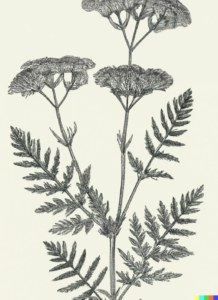I’m a big fan of Yarrow, one of the first herbs I ever learned about – although it was mainly because I loved the flower! I’m currently working on a lotion or salve with yarrow, plantain, and chickweed for mild skin irritations. I’ll let you know how it goes. Below is some information I compiled (with help from ChatGBT :-)), and I’m also including my Yarrow Plant Monograph that I completed when studying at the Herbal Academy. If you’re interested in my other plant monographs please check out the link under the Resources tab in the menu or click here.

DALL-E2 AI rendering of Yarrow as dictated by Kathy McCabe
Yarrow (Achillea millefolium) is an herb that has been used for centuries in traditional medicine for its medicinal properties. It contains various bioactive compounds that contribute to its potential health benefits. While it’s essential to consult with a healthcare professional before using yarrow for medicinal purposes, some of the reported benefits include:
- Anti-inflammatory effects: Yarrow contains flavonoids and sesquiterpene lactones that possess anti-inflammatory properties. It has been traditionally used to reduce inflammation and relieve discomfort associated with various conditions.
- Wound healing: Yarrow has a long history of being used for wound healing. Its astringent properties can help constrict blood vessels and promote blood clotting, aiding in the healing process and reducing bleeding.
- Antimicrobial activity: Yarrow contains volatile oils with antimicrobial properties, making it effective against certain bacteria and fungi. It has been used to treat skin infections and to prevent wound infections.
- Digestive support: Yarrow is believed to have mild digestive properties, helping to stimulate appetite, ease indigestion, and soothe gastrointestinal discomfort.
- Menstrual support: Yarrow is considered emmenagogic, meaning it can stimulate menstrual flow and may be used to regulate menstrual cycles and relieve menstrual cramps.
- Fever management: Traditionally, yarrow has been used to help manage fever by promoting sweating, which can assist the body in reducing temperature during febrile illnesses.
- Respiratory support: Yarrow has been used to alleviate symptoms of respiratory conditions like colds, flu, and bronchitis due to its anti-inflammatory and antimicrobial properties.
- Anxiety and stress reduction: Some traditional practices utilize yarrow for its calming effects, helping to reduce anxiety and stress.
- Pain relief: Yarrow’s anti-inflammatory properties may also contribute to pain relief, helping to alleviate mild pains and discomfort.
It’s essential to use yarrow responsibly and be aware of potential interactions with other medications or health conditions. Pregnant or breastfeeding women and individuals with allergies or sensitivity to plants in the Asteraceae family (such as ragweed) should avoid using yarrow. Always consult with a healthcare professional before using yarrow or any other herbal remedy for medicinal purposes.
While yarrow has various medicinal benefits, it can also have some potential side effects, especially if used improperly or in excessive amounts. Some of the possible side effects and considerations include:
- Allergic reactions: Individuals with allergies to plants in the Asteraceae family, such as ragweed, may also be sensitive to yarrow and could experience allergic reactions. These reactions may manifest as skin rashes, itching, or respiratory symptoms.
- Photosensitivity: Yarrow contains compounds that can increase skin sensitivity to sunlight. People using yarrow products may be more prone to sunburn or other skin reactions if exposed to direct sunlight.
- Gastrointestinal issues: In some cases, yarrow can cause stomach upset, nausea, or vomiting, especially when consumed in large amounts.
- Potential interactions: Yarrow might interact with certain medications or other herbal supplements, affecting their efficacy or increasing the risk of side effects. It is crucial to talk to a healthcare professional before using yarrow, especially if you are taking other medications or have existing health conditions.
- Increased bleeding: Due to its ability to promote blood clotting, yarrow may interfere with blood clotting medications or increase the risk of bleeding in individuals with bleeding disorders.
- Pregnancy and breastfeeding: Pregnant and breastfeeding women should avoid using yarrow, as it is considered an emmenagogue and may stimulate menstruation, which could be harmful during pregnancy.
- Drug interactions: Yarrow may interact with certain medications, including anticoagulants, antiplatelet drugs, and sedatives. It is essential to consult a healthcare provider if you are on any medications before using yarrow for medicinal purposes.
- Children and infants: Yarrow should be used cautiously in children and infants, as their bodies may react differently to the herb. Always seek guidance from a healthcare professional before administering yarrow to children.
To minimize the risk of side effects, it’s crucial to use yarrow responsibly and follow recommended dosages and guidelines. As with any herbal remedy, consulting a qualified healthcare professional is essential before using yarrow for medicinal purposes, especially if you have any pre-existing health conditions or are taking medications.

Kathy is an herbalist/naturopathic practitioner who is constantly researching to expand her knowledge. She came to herbalism after her migraine medicine was suddenly removed from the market and she had to find something new. After discovering the magic of herbs she’s never looked back. She is accredited by the International Practitioners of Holistic Medicine (IPHM) and is an Associate Member of the American Herbalist Guild.

Kathy is an herbalist/naturopathic practitioner who is constantly researching to expand her knowledge. She came to herbalism after her migraine medicine was suddenly removed from the market and she had to find something new. After discovering the magic of herbs she’s never looked back. She is accredited by the International Practitioners of Holistic Medicine (IPHM) and is an Associate Member of the American Herbalist Guild.